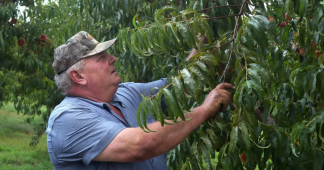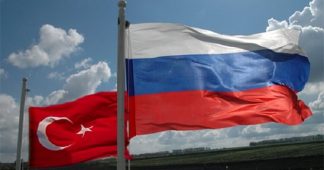The soya curse: Is Ukraine facing the same fate as the Amazon?
12 October 2021
“GM seeds must have been smuggled into the country, because it is not permitted to grow genetically modified soya in Ukraine.” Volodymyr Onatskyi runs a small company selling manure and seeds to farmers in eastern Ukraine. He is increasingly worried about the pace with which big conglomerates are buying up fertile land in the country, depleting soils and polluting fresh water sources by their massive use of chemicals.
Villagers also believe the big farms are illegally planting genetically modified (GM) soya. “The big companies plant them anyway, and in the process contaminate the fields of conventional farmers. That’s what people around here suspect, at least. Because finding out what’s really going on is often very difficult in a country like Ukraine,” Onatskyi said.
Continue reading at www.opendemocracy.net
LATEST NEWS ON THE GMO SITUATION IN UKRAINE
On October 18, 2018 in Kyiv city, Ukraine the Donau Soja initiated organization of a panel discussion on the topic “Non-GMO soybean production: market potential for development of oil and fat industry” within the framework of the II Annual Oil-and-Fat Industry Conference organized by the ProAgro Group Information Company.
On October 18, 2018 the II Annual Oil-and-Fat Industry Conference organized by the ProAgro Group Information Company and supported by the Donau Soja successfully took place in Kyiv city Ukraine.
The conference gathered together more than 60 participants from different Ukrainian and foreign companies which are engaged in the oil and fat industry, among them – agro holdings, producers and processors, traders, suppliers of the storage and processing equipment, banks, NGOs, media representatives, etc.
Continue reading at www.donausoja.org
THE CORPORATE TAKEOVER OF UKRAINIAN AGRICULTURE
DECEMBER 2014
In Walking on the West Side: the World Bank and the IMF in the Ukraine Conflict, a report released in July 2014, the Oakland Institute exposed how international financial institutions swooped in on the heels of the political upheaval in Ukraine to deregulate and throw open the nation’s vast agricultural sector to foreign corporations.
This fact sheet provides details on the transnational agribusinesses that are increasingly investing in Ukraine, including Monsanto, Cargill, and DuPont, and how corporations are taking over all aspects of Ukraine’s agricultural system. This includes circumventing land moratoriums, investing in seed and input production facilities, and acquiring commodity production, processing, and transportation facilities.
Continue reading at www.oaklandinstitute.org
Where Soya has Scale – Ukraine, Big Ag and Land Concentration
Sumy is a small city located in the north-eastern part of Ukraine. An impenetrable mist seems to hold the town hostage on a cold winter day in December. I’m in Sumy because the Kiev-branch of Donau Soja Organisation has organized a seminar for farmers at the regional agricultural university. Local food is served while about forty farming professionals gather in a small classroom on the fourth floor. A German-speaking salesman hands out leaflets about plowing technology that would enable them to decrease the amounts of chemicals on the field or avoid having to use expensive biotechnology altogether.
The farmers want to stay competitive while keeping their practices sustainable in a highly competitive environment, Volodymyr Onatskyi says. Soviet visuals depict classic images of noble workers on the walls. Outside three tanks and a rundown jetfighter add to the dab greyness of the city.
Continue reading at www.arc2020.eu
We remind our readers that publication of articles on our site does not mean that we agree with what is written. Our policy is to publish anything which we consider of interest, so as to assist our readers in forming their opinions. Sometimes we even publish articles with which we totally disagree, since we believe it is important for our readers to be informed on as wide a spectrum of views as possible.











